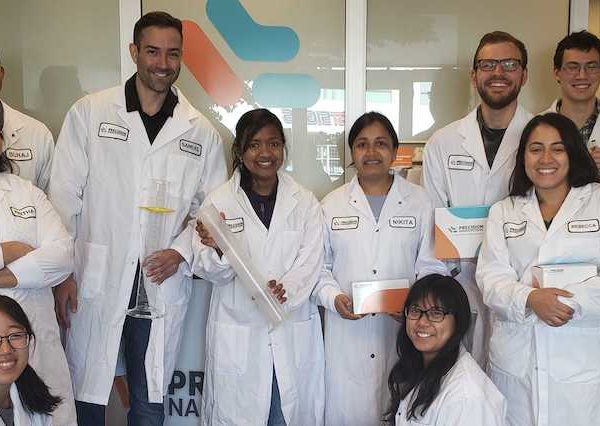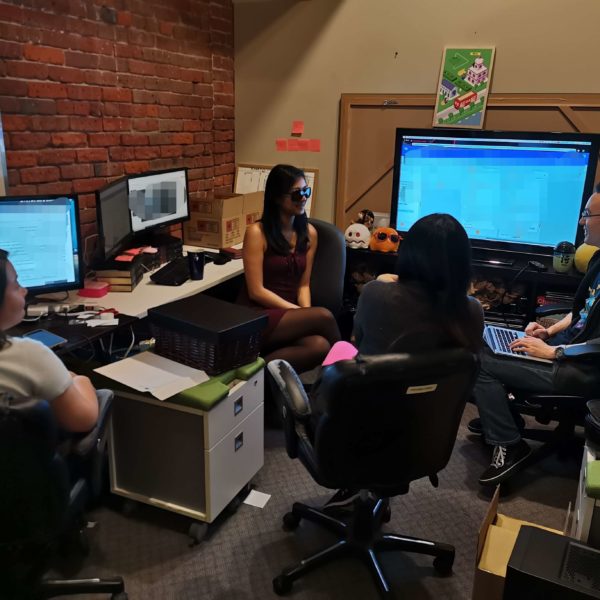The ISI Grant Program is helping tech companies hire students from a range of programs and faculties who attend public and private post-secondary schools in BC. With the help of the ISI Grant Program, biotech company Precision NanoSystems Inc. was able to hire a PhD student to develop new technologies and products for nanomedicine applications. Interview with Anitha Thomas, Head of Formulation, R&D, and Rupsa Gupta, Drug Delivery and Formulations Intern.
Tell me about Precision NanoSystems
Anitha: Precision NanoSystems Inc. (PNI) is a Canadian biotech company that creates innovative solutions for the discovery, development and manufacturing of novel nanoparticles for use as medicines. PNI’s proprietary NanoAssemblr® microfluidics platform enables the manufacturing of next generation nanomedicines. PNI provides microfluidic consumables, instruments, reagents and services to life sciences researchers and builds strategic collaborations to revolutionize healthcare through nanotechnology.
What was your education/work experience prior to working at Precision NanoSystems Inc.?
Rupsa: I am currently pursuing a PhD with the Department of Chemistry at UBC. Before moving to Canada in 2016, I received a MSc in Chemistry from Pondicherry University, Puducherry. I hold a BSc (Honors) degree from St. Xavier’s College, Kolkata, India.
What does a typical day look like in your role?
Rupsa: A typical day at PNI involved discussing the goals of the R&D department and projects, designing and performing my experiments to fulfill these goals, and then later discussing results with the other departments.
Any success stories?
Anitha: With Rupsa’s help, PNI has been able to achieve a lot of impressive work. Rupsa completed multiple, successful projects ranging from developing new application notes on polymeric microsphere manufacturing to working towards launching next generation NanoAssemblr® instruments and consumables.
Rupsa: I successfully completed a scientific application note on one of PNI’s instruments to demonstrate a new application to PNI’s prospective clients. I also contributed to optimizing and developing plate assays, which helped solve an important technical problem in the R&D department. In addition to this, I had the opportunity to work on projects directly with clients, who later went on to become successful and high-investment partnerships for PNI.
Why did you decide to apply for an ISI Grant?
Anitha: While there are many subsidiary program options for undergraduate co-ops, aside from the ISI grant, there are not many funding opportunities to hire PhD students. At PNI we occasionally have projects that require a high level of graduate-level expertise. In addition, there are no other funding equivalents that give students an opportunity to learn and see entrepreneurship first-hand while they are completing their degree.
Without the support of the ISI grant, we could not have hired an intern for eight months. We were so happy with the ISI grant that we have taken another opportunity to apply again for another student from the University of Victoria.
How did you find the application process?
Anitha: We found the program on the Innovate BC website. The application process was easy.
Where did you search to find students?
Anitha: PNI has been able to attract top talent from universities such as UBC and UVIC. We found our PhD candidate, Rupsa, through the UBC Chemistry program and more specifically, the NanoMat NSERC Create graduate program.
What was the best thing about hiring a student?
Anitha: Rupsa was in the second year of her PhD. Her diverse skill set in combination with her experience with various analytical methodologies and particle development was so valuable. She was able to provide great technical insight into the projects that she contributed to during her time with us.
How was it for you to mentor a student?
Anitha: Mentoring Rupsa was a great experience. The culture at PNI is highly entrepreneurial and she was able to learn a lot by observing and participating in our day-to-day activities. We also developed a custom-made course module for her, based on seminars and informational discussions with experts in our company. Now, through the support of this ISI grant, we have a training course that all our ISI interns/co-op can take during their time at PNI to learn entrepreneurial skills.
What would you say to students who want to work at a tech company?
Rupsa: The advice I would give to students wanting to work at a tech company is to leverage their network and proactively communicate with employers. I would encourage them to work in a tech company because there is a lot of flexibility and opportunities to grow and acquire new skills because you get to work with multiple departments.
What was the best thing about working at a tech company?
Rupsa: Working in a tech company gave me the opportunity to work closely with both the engineering and science teams, which gave me the opportunity to learn about product development and validation. By being exposed to both departments, I was able to develop project management and marketing skills that I didn’t necessarily think I would learn in this role.
Why would you recommend the ISI Grant Program?
Anitha: The ISI grant program is unique because it exposes students to the fast paced, constantly evolving tech industry. Students like Rupsa are able to gain industry experience, where they learn the skills to succeed in their post-grad jobs and develop the ability to potentially start their own business in the future. However, it is not just the student who gains from the ISI grant program as a company we were able to accelerate our research, create a new training program and exceed efforts to take a new product to market.
We would recommend this ISI Grant Program to tech companies wishing to hire a knowledgeable PhD student for a 4-8 month period. We also recommend this program to students who are looking to gain industry experience while completing their degree.
Rupsa: The ISI grant program helped me to develop entrepreneurial skills. This program was an excellent opportunity to learn the basics of starting a company, both in practice and theory. The online Market Validation Training course helped me understand the process of developing and selling a product. By interacting with all the departments at PNI, I was able to gain new perspectives that helped the team solve problems.
Any other comments?
Rupsa: Working at PNI was wonderful learning experience. In addition to being able to be a part of solving important problems, I was able to develop better management and organizational skills. I am now more informed and equipped to manage projects successfully. I know the experience I gained at PNI will help me to succeed in my future career endeavours.
Applications:
Interested in applying to the ISI grant program? Applications are open. Your BC-based tech company or startup could receive up to $10,000 a year to hire a post-secondary student.
Hire a student
